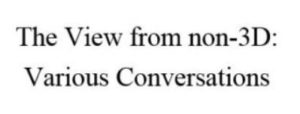
Sunday, August 7, 2016
[Continuing an earlier conversation with Jung]
12:20 p.. I’m ready for more, I think, if you are.
Then let us address the underpinnings of your concerns. The underpinnings, because what you think concerns you is superficial next to the real, substantial, underlying causes.
The problem is not Donald Trump. It is not that so many people see in him desirable traits in a leader. It is not any of the things it appears to be. The problem is that people cannot live forever with lies. Sooner or later, they have to break free or at least make the effort to break free, because if you live in lies you lose the very footing beneath you. Who do you think, among all those citizens, does not have a connection to a non-3D self? Who do you think is all evil, or all ignorant, or all mean-spirited, or all—anything? It is a prime mistake to dismiss people’s knowings, even when they don’t know what they know or how they know it. Even when the ways their knowings express are mistaken, the knowings are not.
I think you are saying, opinions are one thing, emotional basis is another.
You know very well that anyone, stressed significantly, moves from his preferred mode of apprehending reality to the inferior part of the opposing mode. A thinker becomes dominated by his lowest emotions. A feeler becomes prey to his most collective clichéd opinions. This is not a liberal v. conservative thing, much less a Democratic v. Republican thing. It is not enlightened v. undeveloped, open-hearted v. skinflint, accepting v. bigoted. The factor to concentrate on is stress.
You know I made a study of what drew people to the Nazis.
I didn’t know that specifically.
One could hardly avoid it; it was in the air, until anyone who wished to understand and heal the psyche had to ask, what is it that is driving so many people to escape their personal responsibility by giving themselves to a collective? And although I confine myself to the Nazis, it ought to go without saying that it applies to the communists as well. Indeed, more so, in that communism preceded the Nazis and outlived them, and put the world in peril of its life.
But there too you see that finally the collectivist society fell apart of its own weight. It tried to sustain itself by promising material satisfaction and social justice. It gained many years by being able to portray itself as under siege, first by international capitalism, then by the Nazis, then by the Americans and their allies. It is possible that if it had made its experiment in more benign surroundings, in more supportive times, it would have collapsed much sooner or, more likely, would have been forced to shed certain unobtainable ideals in order to save ideals that could in fact be achieved. No one can provide absolute equality even if it were desirable, but with intent and resources one can assure that no one starves, or grows up ignorant for lack of opportunities. You see?
I think so. Pie in the sky can actually get in the way of providing real pie here and now.
All right, that is the material element. But giving people something to believe in is something else. “Without vision, the people perish.” Man cannot live on bread alone. This is very true. People cannot live without ideals.
What drew people to join the Nazis was a combination of many elements, one of which was economic desperation; another, a sense of having been dispossessed; another, an outrage that the older ideals – Fatherland, Kaiser, frugality, discipline – spiritual participation in the culture, call it – were all under attack, which meant that those who had remained to true to these ideals were themselves under attack. Given that there existed a clear opposition – not only the Communists (though they were the most organized, the most dangerous), but all the formerly repressed elements that flourished in the Weimar Republic and seemed to traditional eyes to be scum – militancy seemed necessary and not only justified but so justified that not participating in militant outrage seemed inexcusable.
Sorry, but that will have to do for the moment.
Any time. It won’t be hard to find the place.
1:20. All right.
Perhaps you can see – woe to them who cannot see – that in times of great social dislocation, no set of values, no set of individuals, no parties, no ideologies, are innocent. The Social Democrats, the Communists, the Monarchists – everybody – was as responsible for the rise of the Nazis as everybody else, at least to the extent that they either profited from or assented to the changes disrupting German society. It is all well and good to stand watching and be appalled by the growth of the Nazis as expressed in marches along streets and speeches in mass events. That does not mean that one had had no hand in creating the conditions creating the Nazis.
I recognize the distinction – silent hers but understood – between the psychopaths and sociopaths actually directing the party apparatus, on the one hand, and the people who were drawn to them like moths to the flame.
That distinction is always to be drawn, and you may regard it as a law of life that – other things being equal – sociopaths will rise to lead any organization. That America had its Marshalls and Eisenhowers was a providential exception to the rule, but it does not invalidate it. Naturally, certain kinds of organizational structures are more resistant to being taken over by sociopaths than others.